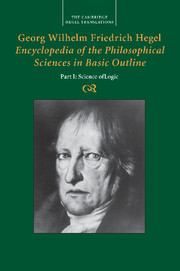 Georg Wilhelm Friedrich Hegel: Encyclopedia of the Philosophical Sciences in Basic Outline
Georg Wilhelm Friedrich Hegel: Encyclopedia of the Philosophical Sciences in Basic Outline Book contents
- Frontmatter
- Contents
- Acknowledgments
- Introduction: Hegel’s Encyclopedia Logic
- Translators’ Note
- Encyclopedia of the Philosophical Sciences in Basic Outline, Part I: Science of Logic
- Part I Science of Logic §§ 19–244
- Bibliography
- Glossary of Translated Terms, German to English
- Glossary of Translated Terms, English to German
- Index
First Subdivision of the Logic: The Doctrine of Being §§ 84–111
Published online by Cambridge University Press: 30 September 2021
- Frontmatter
- Contents
- Acknowledgments
- Introduction: Hegel’s Encyclopedia Logic
- Translators’ Note
- Encyclopedia of the Philosophical Sciences in Basic Outline, Part I: Science of Logic
- Part I Science of Logic §§ 19–244
- Bibliography
- Glossary of Translated Terms, German to English
- Glossary of Translated Terms, English to German
- Index
Summary
§84
Being is the concept only as it is in itself. Its determinations have being, i.e. in their difference they are others opposite one another, and their further determination (the form of the dialectical) is a process of passing over into an other. This progressive determination is at once a matter of setting forth and thereby unfolding the concept, as it is in itself, and at the same time the process of being entering into itself, a deepening of it within itself. The explication of the concept in the sphere of being becomes the totality of being, precisely to the extent that the immediacy of being or the form of being as such is sublated in the process.
§85
Being itself as well as the subsequent determinations, not only those of being but also the logical determinations in general, can be regarded as the definitions of the absolute, as metaphysical definitions of God. More specifically, only the first simple determination within a given sphere, and then the third, which is the return froma difference to the simple relation to itself, can always be regarded in this way. For, to define God metaphysically means to express his nature in thoughts as such. But logic comprises all thoughts as they are while still in the form of thoughts. By contrast, the second determinations, making up a given sphere in its difference [Differenz], are the definitions of the finite. But if the form of definitions were used, this would entail envisaging a representational substratum. For even the absolute, what is supposed to express God in the sense and in the form of thought, remains merely an intended thought, i.e. a substratum that as such is indeterminate, relative to its predicate as the determinate and actual expression in thought. Because the thought, the basic matter solely at issue here, is contained only in the predicate, the form of a proposition, like that subject, is something completely superfluous (cf. § 31 and the chapter on the judgment below [§§ 166 et seq.]).
Addition. Each sphere of the logical idea proves to be a totality of determinations and a presentation of the absolute, and so too does being, which includes within itself the three stages of quality, quantity, and measure.
- Type
- Chapter
- Information
- Georg Wilhelm Friedrich Hegel: Encyclopedia of the Philosophical Sciences in Basic OutlinePart I: Science of Logic, pp. 135 - 172Publisher: Cambridge University PressPrint publication year: 2010
